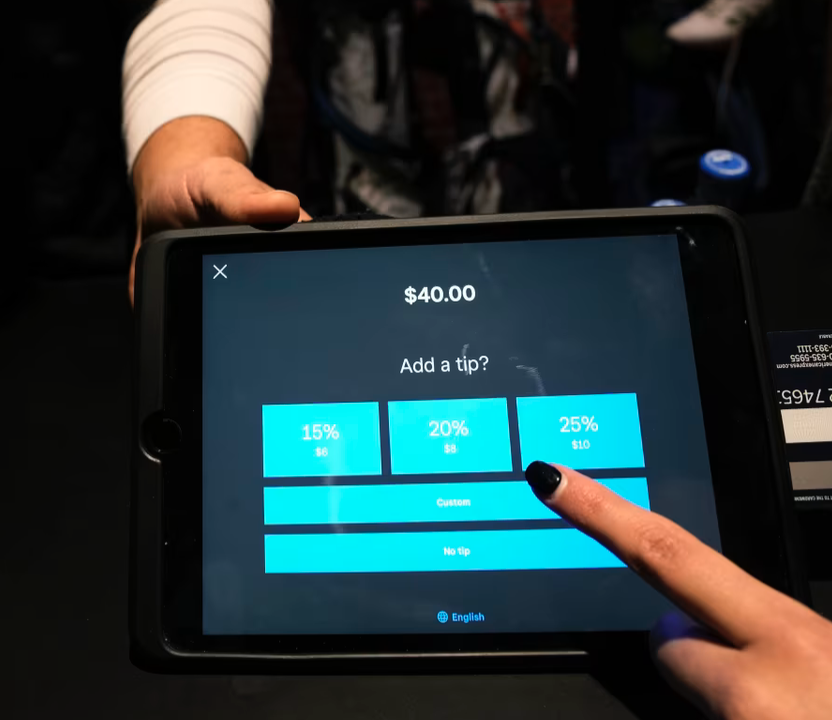When did it become expected to shell out a 25% gratuity for soggy takeout fries?
The screen reads: “Add a tip: 18%. 20%. 25%.” For a takeout sack of burgers and soggy fries? C’mon. It takes extra taps to change it to 10% or zero. Instead, we sheepishly tip and feel resentful. Using Internal Revenue Service data, I extrapolate that tipping has almost doubled since 2013, when San Francisco-based Square turned iPads into cash registers with suggested tips.
Now tips have turned political. Donald Trump recently declared in Nevada: “When I get to office, we are going to not charge taxes on tips.” In 2018 the IRS noted $38 billion in reported tips. Will insurance agents now insist on their pay in tips? Lawyers? Doctors? I’d certainly like my pay as tax-free gratuities.
Nearly five million Americans work for tips. Almost 70% of them are women. But according to a 2023 Bankrate survey, two-thirds of Americans have a negative view of tipping, probably because we’ve been inundated.
Why do we tip? London taverns in the 17th century suggested tipping “To Insure Promptitude.” Now it’s the cheeky “To insure prompt service.” Tipping spread to the U.S. in the 19th century. In 1899 the New York Times called it the “vilest of imported vices.” Probably so. The Pullman Company hired former slaves as porters at low wages. They mainly worked for tips. Wealthy Americans obliged.
One study reveals that we tip because it’s a “social norm,” to “show gratitude,” and to “avoid feeling guilty.” Those answers ring true, but reasons also include the expectation of “poor future service if I don’t tip,” and that “the waiter may yell at me.” Those feel even truer.
My uncle Wilbur was getting bad service in Florida. He flagged down the waiter, “Excuse me, are you expecting a tip?” “Well, yes sir. Yes I am,” the waiter replied. “Well then hurry up and get my wife another vodka and tonic that I’ve been trying to order for the past 15 minutes.” The waiter scrambled. If only it worked that way every time. I have a friend who, after terrible service, would write on the credit card receipt’s tip line, “Bare wires cause fires.” Helpful tip, actually.
One of my first jobs, at 16, was as a carhop (no roller skates) at Stewart’s Root Beer delivering trays to car windows with food and root beer. No tip? We called that getting “zapped.” Minimum wage was $2.10 an hour, but we got paid $1 an hour, plus tips (some weekends we could make $8 or more an hour.) So I always tip, although these days more often reluctantly.
Under the Fair Labor Standards Act, employers receive a tip credit between $2.13 per hour and the federal minimum wage of $7.25. So yes, your tip pays part of workers’ base salaries.
California doesn’t allow tip credits. Workers receive a minimum wage of at least $16 plus all tips. No wonder prices are so high. And California restaurants sneak on fees, like the 6% “SF Health Care Security Ordinance” surcharge. I’ve heard diners tipping 14% instead of 20%. A more honest approach would be to increase prices by 6%. On Monday, S.B. 478 goes into effect, prohibiting drip pricing, meaning prices that are only a portion of what someone actually pays because of fees. Uber Eats and DoorDash are exempt—they can keep larding on fees. New York and Seattle now mandate food-delivery pay increases, and orders are dropping. No surprise. Price, including tips, matters.
Does Donald Trump tip? In 2019 he was photographed boarding Air Force One with $20 bills hanging out of his pants pocket. He explained, “I do like leaving tips at the hotel. You know, I like to carry a little something.” He recently signed one of his bills in Philadelphia for a boy with a blond wig dressed as him.
Celebrities need to be careful tippers. Basketball superstar Michael Jordanreportedly got heat for tipping a Las Vegas waitress only a $5 chip for a drink at a poker table. Hockey legend Wayne Gretzky allegedly grabbed a $100 chip from Mr. Jordan’s stack and put it on the waitress’s tray, saying, “That’s how we tip in Las Vegas.”
I recently hailed a Waymo car in San Francisco and didn’t tip the driver—because there wasn’t one, a gentle reminder that automation often solves pricing problems. Americans don’t hate tipping. We hate that it’s expected, that you’re labeled a tightwad if you don’t tip. How do we get back to tipping being optional? For great service. For promptitude. Not for soggy takeout fries.
To see this article in its entirety and to subscribe to others like it, please choose to read more.
 Listen Online
Listen Online Watch Online
Watch Online Find a Station in Your Area
Find a Station in Your Area









 Listen Now
Listen Now Watch Online
Watch Online
